In what’s believed to be the biggest survey of its kind in the state, the Queensland government-owned corporation, Talking Energy, found renewable technologies are being embraced or piquing the interest of a wide range of Queensland demographics.
The survey took place in late 2020, and involved 4336 respondents across the state – with data separated according to gender, age, location and home ownership. Queensland’s Minister for Energy, Mick de Brenni, described the survey as an illustration of goodwill towards clean energy, calling on renewables industries to “leverage” the surge in interest. “Building on this positive sentiment right now is the key to future of success,” de Brenni said at the virtual Queensland Smart Energy Summit last week, where he teased some of the survey’s findings.
Battery storage
The number of Queensland households with battery storage systems has doubled from 3% to 6% in the last 24 months, with the most significant growth seen in regional Queensland.
Although the total percentage of households with batteries remains small, a third of Queenslanders said they intend to purchase a energy storage system, with 10% planning to do so in the next three years. The number of respondents disinterested in batteries continued to fall.
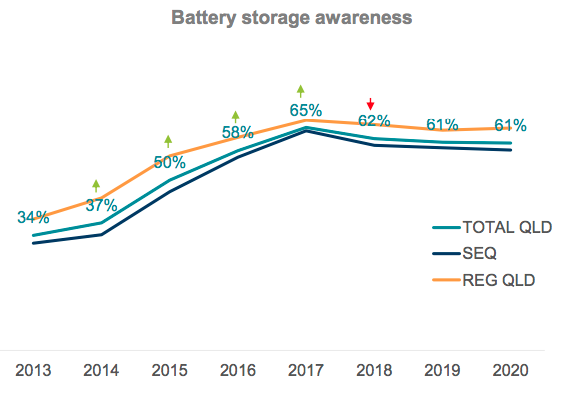
Of those intending to install a battery storage system, 37% are only willing to pay a maximum of $5000, while 32% would pay up to $10,000 and 29% would pay $15,000 or more.
Regional Queenslanders, the group which saw the most growth in battery interest, reported that they see the technology not so much as a means to lower their bills, but rather a way to increase self sufficiency and to be less reliant on the grid.
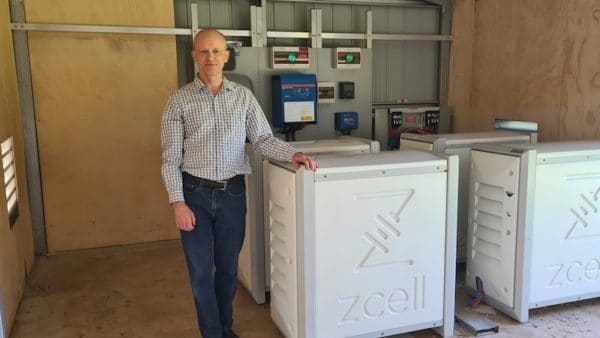
Redflow
As for the barriers, 29% said the technology doesn’t make financial sense yet and a further 24% cited a lack of knowledge.
Just 23% of respondents knew about community batteries, but of those 22% are interested in them.
Almost a quarter (24%) of Queenslander said they would like to go off-grid, particularly Queenslanders between 18 to 34. 56% said they would like to do so to save money, while 37% said the intention was to help save the environment.

Solar
Queensland has among the highest penetration of rooftop solar in the world, and it shows no signs of slowing. A massive 37% of Queensland households have solar, up from 33% in 2019. A further 22% of respondents said they are either looking to install solar or upgrade their solar system in the next three years.
The average quarterly bill for households with solar PV was $231, compared to $383 for households without solar – saving solar households an average of $600 less per year.

Of the households interested in or already installed with solar, 60% said they did so to save on their bills and 30% wanted to do their bit for the environment – a sentiment most prevalent among younger generations of Queenslanders.
Satisfaction with solar’s benefits appears high, with 93% of solar owners saying they would replace their solar system if it were to fail with a system of the same size or bigger.
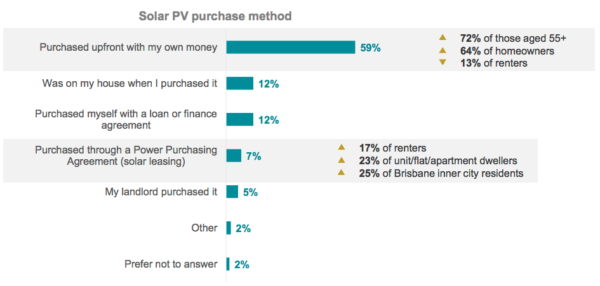
Electric vehicles
Just 3% of Queenslanders have an electric vehicle (EV), though a growing percentage of the population is looking to purchase. That is, 54% of respondents said they’d consider buying an EV compared to 40% two years ago. Of those, 35% are looking to buy within the next three years.
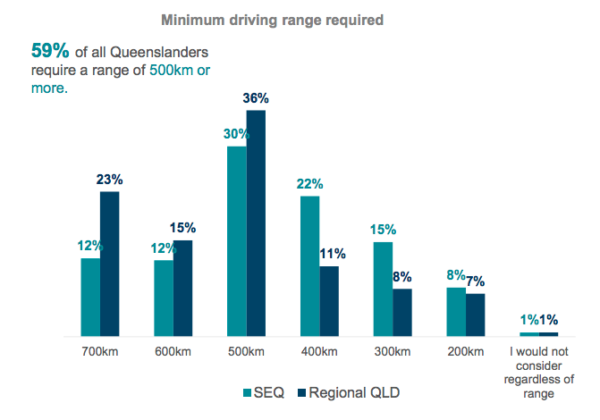
Although respondents’ range requirements differ by region, most of those considering an EV would require a range of at least 500km. The price points most are willing to consider for an EV sit around the $30,000 to $50,000 mark, dropping off considerably above that.
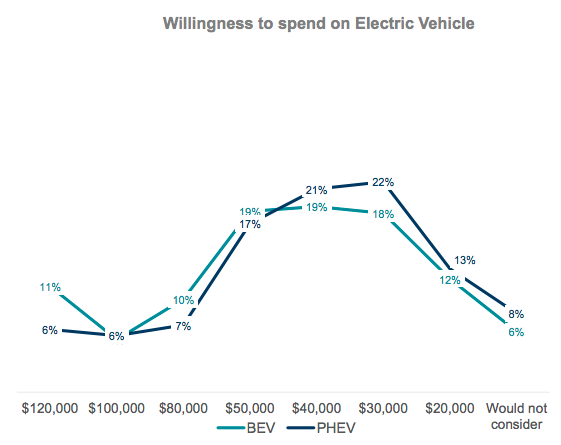
Electricity prices and usage patterns
The growing interest in cleaner technology actually comes as fewer Queenslanders reported feeling concerned about electricity bills. Of those polled, 51% said their level of concern about electricity bills was low while only 29% said it was high. This coincides with a decrease in average bills.
While the rooftop solar boom in Australia is often linked with a spike in electricity prices, which peaked around 2016, it seems the decline in costs is not causing disinterest in renewable alternatives.
You can read the full report on the survey’s findings here.

Calls for government incentives
Responding to the survey, Queensland community group Solar Citizens called on the government to do more to bridge the technology price barriers through incentive schemes.
“This survey shows that there’s a real appetite in Queensland for battery storage and cleaner electric vehicles but cost remains a barrier to accessing these technologies,” said Stephanie Gray, Energy Strategist at Solar Citizens.
“This is where the state and federal governments can play a constructive role. By incentivising the rollout of battery storage and electric transport they can bring down the cost of clean technology to make it easier for more Australians to save money and do their bit for the environment.
“Governments played a key role in bringing down the cost of rooftop solar by incentivising uptake and now Australian homes and businesses are leading the world. It’s our great energy success story and we can do that again.”
Earlier this month, Solar Citizens released the findings of a survey it had commissioned – revealing areas that have traditionally been Queensland’s conservative strongholds are now showing clear support for clean energy. Its regional-only poll found more than half of regional Queenslanders believe clean energy industries will be major employers by 2030, while just shy of half support transitioning to a renewables-dominated grid in the next 15 years or sooner.
This content is protected by copyright and may not be reused. If you want to cooperate with us and would like to reuse some of our content, please contact: editors@pv-magazine.com.
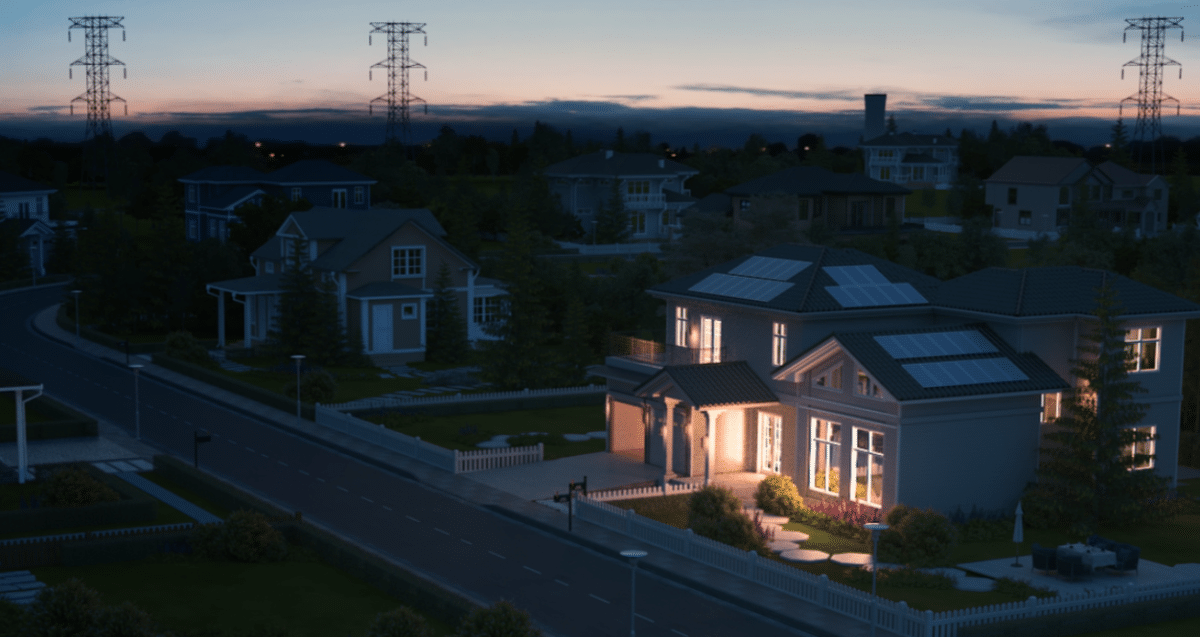








By submitting this form you agree to pv magazine using your data for the purposes of publishing your comment.
Your personal data will only be disclosed or otherwise transmitted to third parties for the purposes of spam filtering or if this is necessary for technical maintenance of the website. Any other transfer to third parties will not take place unless this is justified on the basis of applicable data protection regulations or if pv magazine is legally obliged to do so.
You may revoke this consent at any time with effect for the future, in which case your personal data will be deleted immediately. Otherwise, your data will be deleted if pv magazine has processed your request or the purpose of data storage is fulfilled.
Further information on data privacy can be found in our Data Protection Policy.